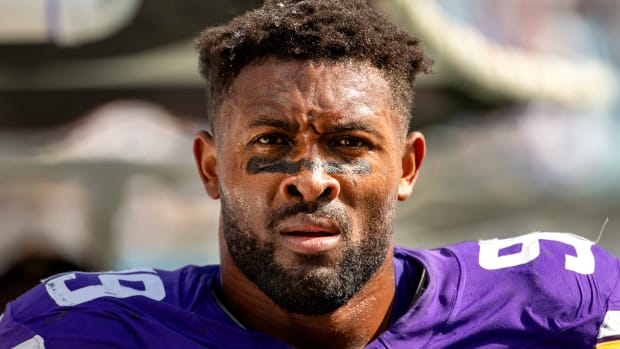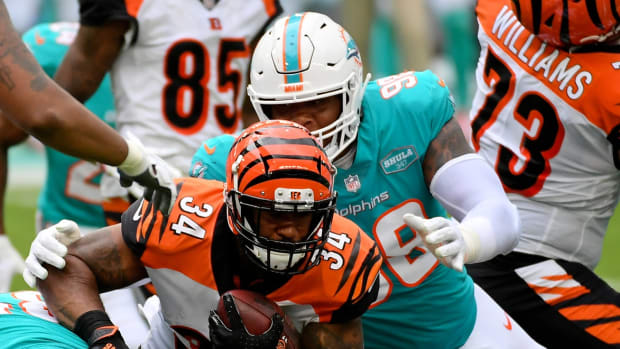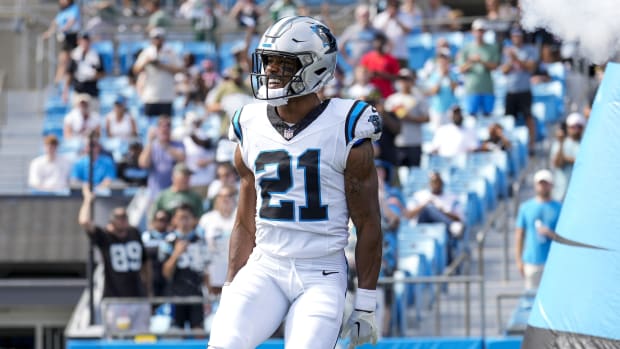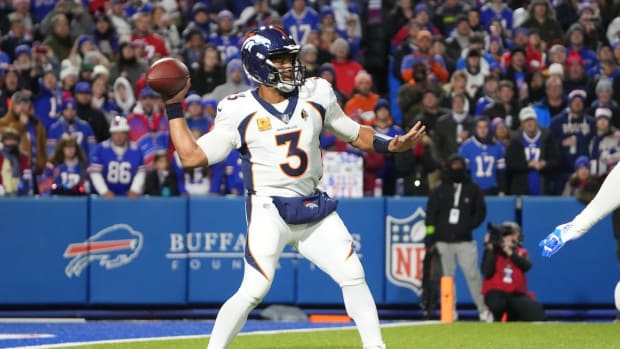Can An NFL Owner Legally 'Fire' A Player For Protesting?
During a campaign rally for U.S. Senator Luther Strange in Huntsville, Alabama, on Friday, President Donald Trump spoke extensively about television viewership of NFL games. Trump, who attempted to buy the Buffalo Bills a few years ago and who as owner of the New Jersey Generals participated in a USFL lawsuit against the NFL back in the 1980s, stressed that, “NFL ratings are down massively.” Whether the decline is “massive” is open to interpretation—the decline has varied significantly by game and network and ranges from 3% to 19%—but the President is correct in observing that ratings have, in fact, dropped from previous seasons. Richard Deitsch explored this drop in a column this week. It has been linked to several possible causes, including the impact of Hurricane Irma on key TV markets.
Trump offered his diagnosis of the ratings drop. He connected it to fan frustration over penalties for players hitting one another “too hard” and to fans seeing “those people taking the knee when they’re playing our great national anthem.” Trump, in fact, urged fans to “leave the stadium” when they see players kneel during the anthem. He also suggested that NFL owners—whom he emphasizes are his “friends”—should fire players who kneel. “Wouldn’t,” Trump asked the crowd, “you love to see one of these NFL owners, when somebody disrespects our flag, say: ‘Get that son of a b---- off the field right now. Out. He’s fired. He’s FIRED!” Trump opined that the first owner to “fire” such a player would become “the most popular person in this country.”
Trump’s comments refer to a growing list of NFL players who have kneeled, raised a fist or put a hand on a teammate’s shoulder during the playing of the national anthem. The list includes Marshawn Lynch, Chris Long and Michael Bennett. The first player to do so was Colin Kaepernick, who remains unsigned. These players hope that their symbolic acts raise awareness of injustice and prompt action.
In response to Trump’s speech, a number of current and former players took to Twitter Friday night to raise their objections. SI’s KellenBecoats has compiled the list of tweets. Reggie Bush wrote that Trump is the “definition of a clown” while Zach Brown urged Trump to “stay in [his] place” since “football has nothing to do with [you]”—a statement that seems to address Trump’s demand that ESPN apologize for Jemele Hill’s sharp rebuke of Trump. Several other players responded to Trump’s speech by reiterating their support for Kaepernick, with Husain Abdullah using Trump’s comment about owners being his “friends” to opine, “now we know why Kap ain’t playin.” (click here for more on whether Kaepernick has a legal case for collusion).
On Saturday morning, NFLPA executive director DeMaurice Smith joined the players in rejecting Trump’s comments. “We will never back down,” Smith tweeted, “when it comes to protecting the constitutional rights of our players as citizens as well as their safety.” About an hour later, NFL commissioner Roger Goodelloffered a statement that raised a similar sentiment. “Divisive comments like these,” Goodell expressed, “demonstrate an unfortunate lack of respect for the NFL, our great game and all of our players, and a failure to understand the overwhelming force for good our clubs and players represent in our communities.”
Contract implications of Trump encouraging owners to “fire” players
Trump’s comments raise an intriguing legal question: could NFL owners heed the President’s advice and fire players for kneeling during the anthem?
The answer is probably yes, though it is by no means a sure thing.
As a starting point, it’s worth highlighting the limits of constitutional rights in the context of NFL players. While a player has the same First Amendment right to free speech and expression as other Americans, that right only protects him from sanction by the government—it does not insulate him from sanction by his team or the league.
A player’s rights as an employee are largely determined by contract. There are two relevant contracts here: the player’s employment contract with his team and the collective bargaining agreement that governs the player’s working conditions as an employee of one franchise in a league.
The standard NFL player contract—which every player signs—offers considerable discretion to teams in the decision to terminate a player’s employment.
Take Paragraph 2 for “employment and services.” In it, the player pledges to “conduct himself on and off the field with appropriate recognition of the fact that the success of professional football depends largely on public respect for and approval of those associated with the game.” This fairly vague language might allow a team to reason that if a player engages in protest that diminishes “public respect” for “those associated with the game” then the player is in breach. How “public respect” is impacted by player protests is not clear and probably varies by whom you ask. As MMQB’s Tim Rohanrecently found, some fans deeply admire the protests while others detest them.
Paragraph 11, which concerns “skill, performance and conduct,” is also relevant. Paragraph 11 stipulates that the team can terminate a player’s contract if the player “has engaged in personal conduct reasonably judged by Club to adversely affect or reflect on Club.” Notice that Paragraph 11 empowers the team to “reasonably judge” the impact of any player’s “personal conduct” on the team. A team might reason that if a player’s protest offends the President, along with some fans, then it has adversely affected the team.
A team might also cite Article 46 of the collective bargaining agreement if it sought to “fire” a player. Although Article 46 concerns “commissioner discipline,” a team could intuit that a player whose conduct runs the risk of Article 46 punishment is a player who ought to be fired. Article 46 expresses that the commissioner can punish players “for conduct detrimental to the integrity of, or public confidence in, the game of professional football.” If Trump is correct that player protests hurt TV ratings—and perhaps make sponsors less interested in sponsoring the league and its teams—then there may be a plausible connection between anthem protests and “public confidence” in the NFL. Then again, Goodell’s own statement Saturday morning suggests the opposite conclusion: Goodellbluntly criticized Trump for delivering a “divisive” message about players and national anthem protesting.
If a player is “fired” for protesting, note that he may still be owed money from his team. Often when an employee is fired, he or she has an “at will” relationship with their employer, meaning the employee or the employer can end the relationship with relative ease. An NFL player is in a different position. He has an employment contract. If he or his team ends the employment relationship before the contract expires, then the contract has been breached. The contract stipulates whether the player is still owed money. Although NFL contracts generally do not “guarantee” money, some players sign contracts with guarantees that require future payments. A “fired” player would still receive those payments.
Trump Calls on NFL Owners to Fire Players Who Protest, and Mocks Efforts to Make the Game Safer
How a player could challenge being fired: grieve and, if necessary, sue
A fired player can invoke Article 43 of the CBA to contest being cut for expressing his political views. Article 43 concerns grievances for contractual disputes that do not involve injuries. Article 43 allows players to receive an arbitration hearing before an arbitrator who is chosen by both the NFL and NFLPA. In other words, the arbitrator would be neutral, unlike when a player challenges discipline under Article 46 and the commissioner serves as the default arbitrator.
The arbitrator would then start a grievance process that would take up to a couple of months. He or she would review briefs, hold a hearing, examine evidence and evaluate witness statements. In a grievance, the player would contend that a peaceful protest to the anthem could not plausibly be considered a threat to the “public respect” and “public confidence” in the game. After all, the right to political protest is a core American value and one that distinguishes the U.S. from many other countries. A player engaging in it should not offend fans or sponsors doing business in the U.S.
In response, the team would highlight that the player’s contract provides substantial discretion to the team in deciding when to end a player’s contract. Likewise, the team would assert, nothing in the player’s contract expresses he has a right to political protests during games. The team could also point out that many fans are, like the President, offended by anthem protests.
The arbitrator would then issue an award (decision). Under Article 43, it is considered the “full, final and complete disposition of the grievance.”
The losing side, however, could challenge the arbitration award in federal court—just like Tom Brady, Adrian Peterson and now Ezekiel Elliott have petitioned federal courts to vacate arbitration awards. Federal courts review arbitration awards with great deference, meaning relief from a federal court in an arbitration case is unlikely.
Other legal options for the player: an EEOC charge and a defamation lawsuit
At least in theory, a player might seek other avenues for legal redress.
For instance, a player could pursue remedies offered by the Equal Employment Opportunity Commission. The EEOC is a federal agency that reviews charges of discrimination. Federal laws guarantee that employees cannot be subject to different types of discrimination as well as certain kinds of employer retaliation. If, for instance, an African American player could show that being fired for protesting the national anthem is associated to his race, he would have a plausible argument that he has been subject to race discrimination. Likewise, if other players supportive of the protests are fired as retaliation, those players might have suffered unlawful harassment. EEOC charges take time to play out, and are complicated in this context by the presence of a CBA. Still, a fired player might seek relief from the EEOC.
A player might also draw on state and municipal legal protections for expressing political views. As Richard Deitsch and I discussed last week in the context of Jemele Hill, Connecticut has enacted a statute that forbids employers from disciplining or firing employees on account of those employees exercising their First Amendment right to free speech. Similar laws might be available for players in other localities, though such laws may (as in Connecticut) contain significant exceptions that limit their effect.
Defamation law is also relevant. For example, if an owner criticizes a protesting player as “Un-American,” the player might consider filing a defamation lawsuit against the owner—especially if that owner cuts the player. Such a lawsuit would face long odds, however, in part because defamation concerns statements of fact, not of opinion or subjective expressions. The term “Un-American” is not a measurable term and has different meanings to different people. Further, a player is a public figure and thus must prove actual malice in a defamation lawsuit. This requires the player to show that not only is the statement false but that the owner knew it was false.
Donald Trump Rescinds Warriors' White House Invitation After Stephen Curry Comments
“Firing” a player is not just about the law
The above is a legal analysis of whether a player can be fired for protesting the national anthem. It should not be considered a complete analysis of whether an owner ought to fire a protesting player. There are many reasons to believe such a move would backfire badly on the owner and give rise to a difficult crisis for the league. Legal reasons are explained above, but consider how players would respond. It stands to reason that other NFL players would be more inclined to protest if one of their brethren was fired for doing so. In fact, the President’s remarks on Friday might lead to more players protesting.
Taking it a step further, it is possible some players could consider a walkout of games or a one-week strike if a fellow player were cut for protesting. That might sound crazy, but this topic has clearly touched a nerve with players.
Then consider the fans. Even fans who dislike anthem protests might regard such a practice as embodying the American ideals of freedom of speech and expression. Along those lines, believing in freedom of speech means supporting the right of others to express unpopular and controversial views. Those views might even offend. But many believe firmly in the right of others to express them.
If any NFL owner is contemplating “firing” a player for protesting the anthem, that owner should carefully think through potential reactions to such an action.
Michael McCann is SI’s legal analyst. He is also an attorney and the Associate Dean for Academic Affairs at the University of New Hampshire School of Law.





































